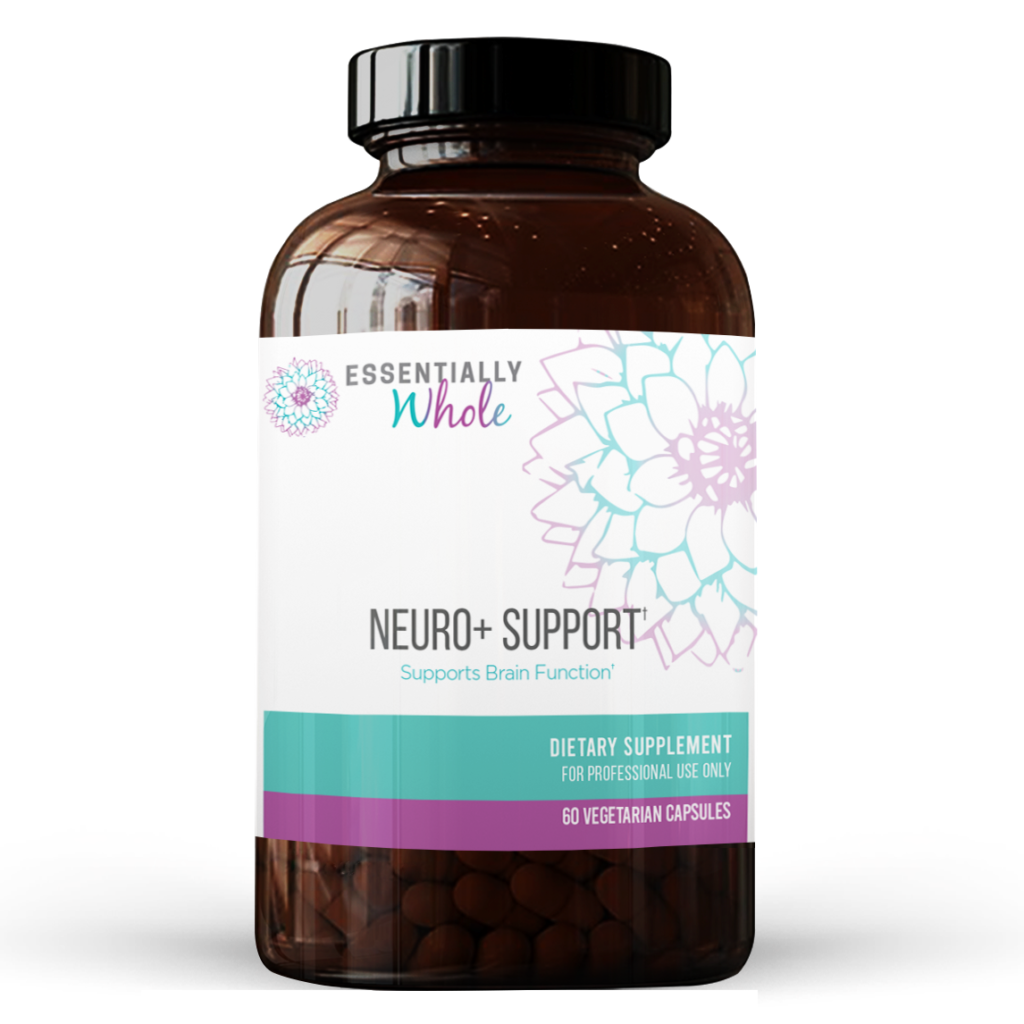
You walk into a room and forget why you’re there…
You start reading a page and then, halfway down, realize you’ve zoned out so you have to go back and start over…
Your brain feels SO scattered that it’s like herding cats to try to keep your thoughts focused on the email you’re trying to write…
And you’re SO frustrated because you feel like your memory is failing you, your brain is slowing down, and your mental energy is just nonexistent.
These are things I hear so often, and women are wondering, “Should I be concerned?”
Especially as we get older, the risks of Alzheimer’s and dementia begin to weigh heavily on us, and we think “NOT YET!”
Rest assured, for a majority of women, you are not dealing with early-onset memory loss… for most of us in perimenopause and menopause, it’s brain fog.
So much of our mental energy gets divvied out to a plethora of tasks every single day. We have to keep these plates spinning, but we feel drained, disorganized, and foggy.
Brain fog, memory struggles, trouble focusing, and mental fatigue are all very real things—especially if you’re in perimenopause or menopause. (Or if you have kids… “mom brain” is a VERY real thing, I’m finding!)
A certain amount of memory issues are age-related. As your body ages, so do the blood vessels and brain cells, or neurons, that your brain relies on to transmit information. They don’t communicate as well with each other, causing brain function to slow down—a bit.
It may take you a little longer to recall information, learn something new, or screen out distractions, but there’s no reason to expect significant memory or cognitive decline as we age if we take care to keep our bodies and brains healthy.
Whatever your age or risk factors are for brain-related conditions, it’s important to be proactive about protecting the health of your brain as you get older!
WHY FOCUS ON BRAIN HEALTH IN PERIMENOPAUSE AND MENOPAUSE?
This is a time of so much change for your body.
Some of the more aggressive symptoms like hot flashes, night sweats, and insomnia lead to poor sleep which makes you more tired in the first place.
Add to that your fluctuating hormone levels and you’ve got a recipe for a worn-out mind and body, and none of it is your fault! Hormone changes alter your brain chemistry in ways that are unavoidable at this stage of your life—but these changes are still manageable when you have the right tools (which I’ll share below)!
(I go even deeper into the reasons cognitive decline happens in menopause and what you can do to fix it in my newest book The Essential Oils Menopause Solution. There’s an entire chapter dedicated to the topic! Grab your copy here today.)
Here are some of the ways hormone changes impact your brain:
Estrogen is a hormone that we connect with our reproductive system, but it also plays an important role in your brain, especially for learning and memory. As it spikes and dips in perimenopause (and then levels out at a much lower level in menopause), you may notice yourself struggling to recall someone’s name or remembering something you read on the news this morning.
Progesterone influences the growth, development, and repair of brain cells. It can also protect the brain from damage, reducing swelling after injury and myelination, the process of forming a protective sheath around a nerve to maintain a seamless flow of communication between neurons. A breakdown in this process can make your recall time much slower and leads to that “foggy” feeling many of us know all too well.
Cortisol is your stress hormone that is released when your body perceives a threat of any type (even if it’s just your phone pinging all morning long). At the moment, a spike in cortisol may sharpen your thinking and enhance your ability to consolidate short-term memory because you need total focus when your survival is at stake.
The problem lies in chronically elevated cortisol levels, which damage the structure of the brain and rewire its communication network, creating lag-time and difficulty in accessing, contextualizing, storing, and retrieving long-term memories. In short? Brain cells die off, aging the brain prematurely.
Brain fog and cognitive difficulties are symptoms of both an underactive and an overactive thyroid. Memory problems, especially related to verbal memory, difficulty concentrating, and small changes in executive functioning (planning, impulse control, and decision-making) are linked to hypothyroidism. People with hyperthyroidism may have trouble concentrating, slower reaction times, and decreased spatial organization skills.
Dysregulated insulin and blood sugar also have a major impact on how your brain works. Your brain is a high-energy organ: it uses up to 50% of all the sugar your blood transports throughout your body. Thinking, learning, and memory all rely on a sufficient supply. Not enough and the brain slows, resulting in poor attention and forgetfulness, an all-too-familiar feeling that hits around 3 pm.
When insulin levels in the brain decrease due to insulin resistance, cognition can be impaired. Chronic blood sugar imbalances can also mess with neurotransmitters like serotonin that help keep our moods stable, opening the door to depression and anxiety, and making it even tougher to plan, remember, and pay attention.
HERE ARE 5 SIMPLE WAYS YOU CAN PROTECT YOUR BRAIN AND KEEP YOUR THINKING SHARP AND CLEAR EVERY DAY:
All is not lost.
You can reclaim your mental stamina, concentration, and memory at any age—you just need to be consistent and intentional!
The good news is that many of the things you’re already doing to help your hormones and keep yourself healthy are also GREAT for your brain. Here are 5 specific, daily things you can focus on to protect your brain’s longevity:
#1: Exercise for your brain
As with everything, exercise is a very personal thing. What works for your body may not work for someone else’s. But research does show that consistent exercise that increases your heart rate does protect your brain and even build new connections to improve focus, memory, learning, and more. (1)
Resistance training and more gentle exercises (like yoga and tai chi) also show promising results in research to improve your cognitive functions, which is great news for all of us in perimenopause and menopause! The things you’re doing to support your muscle and bone health (without over-taxing your already stressed hormone levels) will also improve your brain function.
#2: Keep Your Brain Active
Whole-body exercise is great for your brain—but like any “muscle” or system, working your brain specifically is essential to keeping it healthy.
Brain exercises, puzzles, reading books, and improving mental sharpness all have been proven to boost memory, concentration, and focus at any age!
Some fun research has been done to back this up, finding things like:
- Jigsaw puzzles protect your brain and vision from aging. (2)
- Card games improve memory and thinking, and some may even grow certain areas of your brain. (3)
- Reading and increasing vocabulary keep your brain stimulated and active to prevent cognitive decline. (4)
- Experimenting with new dance moves can increase your brain’s processing speed and memory. (5)
- Learning a new skill or language will improve your memory, increase your creativity, and offer even more cognitive benefits as you get older. (6) (7)
- Listening to music helps balance your mood and boosts creative thinking. (8)
- Meditating not only reduces your stress levels, but it also increases your brain’s capacity to process information. (9)
#3: Brain-Healing and Protective Foods
Focus on stabilizing blood sugar (so your brain has what it needs all day and doesn’t send cravings signals to your body for sugar).
These “cravings” often feel like hunger, but really they’re just mixed-up signals coming from your brain due to stress, insulin resistance, or blood sugar instability. You can do this by spacing out your meals and focusing on protein and healthy fats to keep your body satisfied and keep things stable between mealtimes.
Antioxidants protect and heal damage in your cells, and they’re especially important for your brain. Since your brain goes through so much energy, it also generates a lot of waste. This needs to go somewhere so it doesn’t clog up your neural connections and slow your thinking, memory, concentration, and energy levels. Antioxidants work as little “vacuum cleaners” to help clear out this oxidative stress so your cells can work as efficiently as possible!
And finally, healthy fats restore neurotransmitter connections so you can build and recall memories and stay sharp and focused. Each brain cell has a sheath of fat that protects it and helps it connect with its surrounding cells. As this degrades (whether due to age or stress), we need to supply the building blocks for our bodies to replenish these cells.
Some of my brain-boosting favorites are:
- Antioxidant-rich fruits like blueberries and citrus
- Coconut oil
- Avocados
- Dark Chocolate
- Pumpkin Seeds
- Green Tea (Matcha)
- Celery
- Leafy Greens
- Nuts
You can get a done-for-you meal plan that includes all of these (and more) in delicious recipes in Part III of The Essential Oils Menopause Solution! Grab your copy here >>
#4: Intermittent Fasting for Brain Health
The health of your brain is directly linked to the health of your gut, and intermittent fasting may be the answer to clear your mind and give you the energy you are missing!
Constant inflammation in your gut also leads to inflammation in other areas of your body, especially the brain. Allowing your body to fully process the food that you eat is an important step in regaining your mental clarity and energy by cutting down on how inflamed your gut is.
Intermittent fasting can help to prevent cognitive degeneration by keeping your neurons firing correctly. (10) It also is great for many women to help stabilize blood sugar levels all day since frequent eating causes spikes and dips that your brain just doesn’t respond well to.
Read more about using intermittent fasting to support your brain’s health in this article >>
#5: Supplement with Key Nutrients Your Brain Needs
Last but not least, supplements are a critical piece of maintaining the health and sharpness of your brain.
Like every system in your body, your brain relies on many key nutrients to function at its best. But once we hit perimenopause and menopause, our body naturally burns through many of these faster than we did before—leaving more room for deficiencies. We also often need MORE supplements during this stage of life for their protective benefits.
Your body’s needs are changing, and supplements are the best way to meet those needs quickly and easily every day.
Here are some of my go-to recommendations for all women to improve brain function and to protect it from the damage caused by stress or age:
Activated B Complete. B vitamin deficiency is super common for women in our age bracket. It’s just hard to get all you need through diet alone. An activated B complex vitamin is the perfect way to fill in the gap to give your body the support it needs.
B vitamins are necessary for producing energy within your cells, as well as maintaining the health of your brain cells in particular. They also play a crucial role in breaking down homocysteine, which is a compound that has been linked to an increased risk of dementia and Alzheimer’s.
Activated B Complete is formulated with only the best, purest B vitamins that are activated (or methylated) for easy absorption. Check it out here >>
Omega-3 Fatty Acids. Your brain and nervous system need healthy fats to function at their best. Omega-3 fatty acid supplements are a good, natural way to support your body’s ability to protect your brain, form healthy balances of neurotransmitters, and restore balance to your stress hormones. They help keep down inflammation and prevent damage to your cells, which is so often behind feelings of brain fog. This is the brand I currently use and love.
Vitamin D Complete. With vitamin D receptors in every cell of your body including your brain cells, making sure you have enough vitamin D should be a priority. Having enough vitamin D protects your brain cells from developing plaque and damage that can lead to dementia and Alzheimer’s, and it ensures they run efficiently so you can maintain your highest level of focus and clarity.
My Vitamin D Complete supplement is formulated with vitamins K1 and K2 so you have everything you need to absorb the vitamin D and get it where it needs to go! Get it here >>
Rhodiola. Rhodiola is an adaptogenic herb that helps to increase serotonin levels, which can improve your overall mood and may improve your reasoning skills as well. It can enhance energy metabolism and increase the capacity of your mitochondria to produce energy-rich compounds in the brain, as well as in the rest of your body. It can also protect you against physical and mental stress, fatigue, toxins, and more. (11)
Curcumin. Unlike other supplements, curcumin provides almost immediate memory-boosting benefits. A study found that Alzheimer’s patients experienced a boost in memory and retention in as little as an hour after taking curcumin, in addition to improved mood and stress levels. (12)
While you can get some curcumin from dietary consumption of turmeric, a supplement is the most efficient way to get the results. Just be sure your chosen supplement has no artificial fillers or additives that take away from its purity!
Essentially Whole® Neuro+ Support. This is a supplement that combines many powerhouse ingredients that work together to energize your brain, improve your memory and ability to think and address some of the root causes behind your brain fog. It includes:
- Acetyl-L-Carnitine, which gives your cells their energy, repairs damaged brain cells, and improves your ability to learn and remember. (13) (14) It even shows promise as a way to protect against age-related memory decline and Alzheimers! (15)
- Citicoline, a compound found in every cell of your body that supports healthy brain activity by supplying materials that your brain cells use to communicate with each other. (16) (17) (18) (19) (20)
- Glycerophosphocholine, another substance found in every one of your cells. It crosses the blood-brain barrier to directly impact how your brain cells are able to work, which helps your memory and concentration. It even can help correct some of those hormone imbalances that could be causing your brain fog. (21)
- Coffee Fruit Concentrate, derived from the whole fruit of the coffee tree. It harnesses the good, stimulating aspects of coffee—helping you stay more alert and focused— without the jittery side effects. (22) (23) Since it uses the whole fruit, there are even more bioavailable compounds than you get from brewed coffee!
- Phosphatidylserine, an important part of your cell membranes that makes it possible for your brain cells to communicate with each other. It also limits and controls the release of cortisol, the stress hormone that can wreak havoc on your body if it stays elevated. (24) (25)
- Gingko Leaf increases circulation in your brain to improve your memory, prevent dementia and Alzheimers, balance hormone levels, and keep your brain cells healthy. (26) (27) (28) (29)
Neuro+ Support is my #1 recommendation to improve mental sharpness and memory, clear brain fog, and protect your brain health long-term!
You just can’t get the power that’s in this supplement anywhere else, and it really works. If I have a big project to work on, I always take one of these before I start and can absolutely feel the difference in my ability to focus and concentrate.
Here’s what Valerie had to say:
“I was surprised to start noticing results already. I have been having less brain fog and I am thinking more clearly. I’m so thankful to have found supplements that I feel are making a real difference for me. Thank you, Dr. Mariza!”
Resources:
- https://www.health.harvard.edu/blog/what-kinds-of-exercise-are-good-for-brain-health-2018050213762
- https://www.ncbi.nlm.nih.gov/pmc/articles/PMC6174231/
- https://www.ncbi.nlm.nih.gov/pmc/articles/PMC4417099/
- https://www.researchgate.net/publication/311222670_Vocabulary_and_the_Brain_Evidence_from_Neuroimaging_Studies
- https://neuro.hms.harvard.edu/harvard-mahoney-neuroscience-institute/brain-newsletter/and-brain/dancing-and-brain
- https://www.ncbi.nlm.nih.gov/pmc/articles/PMC4154531/#R13
- https://www.ncbi.nlm.nih.gov/pmc/articles/PMC3583091/
- https://journals.plos.org/plosone/article?id=10.1371/journal.pone.0182210
- https://www.nccih.nih.gov/health/meditation-in-depth
- https://www.cell.com/neuron/fulltext/S0896-6273(16)30837-6?_returnURL=http%3A%2F%2Flinkinghub.elsevier.com%2Fretrieve%2Fpii%2FS0896627316308376%3Fshowall%3Dtrue
- http://www.medref.se/rosenrot/Brown_Rhodiola_rosea.pdf
- https://www.ncbi.nlm.nih.gov/pmc/articles/PMC2781139/
- http://catalogue.designsforhealth.ca/BrainVitale.pdf
- https://www.rxlist.com/acetyl-l-carnitine/supplements.htm
- https://ntp.niehs.nih.gov/ntp/htdocs/chem_background/exsumpdf/carnliposupp_508.pdf
- Secades JJ, Lorenzo JL. Citicoline: pharmacological and clinical review, 2006 update. Methods Find Exp Clin Pharmacol. 2006 Sep;28 Suppl B:1-56. Review. PubMed PMID: 17171187
- Wurtman RJ, Regan M, Ulus I, Yu L. Effect of oral CDP-choline on plasma choline and uridine levels in humans. Biochem Pharmacol. 2000 Oct 1;60(7):989-92.PubMed PMID: 10974208
- López-Coviella I, Agut J, Savci V, Ortiz JA, Wurtman RJ. Evidence that 5′ cytidinediphosphocholine can affect brain phospholipid composition by increasing choline and cytidine plasma levels. J Neurochem. 1995 Aug;65(2):889-94. PubMed PMID: 7616250
- Babb SM, Wald LL, Cohen BM, Villafuerte RA, Gruber SA, Yurgelun-Todd DA, Renshaw PF. Chronic citicoline increases phosphodiesters in the brains of healthy older subjects: an in vivo phosphorus magnetic resonance spectroscopy study.Psychopharmacology (Berl). 2002 May;161(3):248-54. Epub 2002 Mar 22. PubMed PMID: 12021827
- Silveri MM, Dikan J, Ross AJ, Jensen JE, Kamiya T, Kawada Y, Renshaw PF, Yurgelun-Todd DA. Citicoline enhances frontal lobe bioenergetics as measured by phosphorus magnetic resonance spectroscopy. NMR Biomed. 2008 Nov;21(10):1066-75. doi: 10.1002/nbm.1281. PubMed PMID: 18816480
- http://catalogue.designsforhealth.ca/BrainVitale.pdf
- T. Reyes-Izquierdo, R. Argumedo, C. Shu, B. Nemzer and Z. Pietrzkowski, “Stimulatory Effect of Whole Coffee Fruit Concentrate Powder on Plasma Levels of Total and Exosomal Brain-Derived Neurotrophic Factor in Healthy Subjects: An Acute Within-Subject Clinical Study,” Food and Nutrition Sciences, Vol. 4 No. 9, 2013, pp. 984-990. doi: 10.4236/fns.2013.49127
- Reyes-Izquierdo T, Nemzer B, Shu C, Huynh L, Argumedo R, Keller R, Pietrzkowski Z. Modulatory effect of coffee fruit extract on plasma levels of brain-derived neurotrophic factor in healthy subjects. Br J Nutr. 2013 Aug 28;110(3):420-5. doi: 10.1017/S0007114512005338. Epub 2013 Jan 14. PubMed PMID: 23312069
- https://catalog.designsforhealth.com/assets/itemresources/BrainVitale_Tech%20Sheet.pdf
- Hellhammer J et al. Effect of soy lecithin phosphatidic acid and phosphatidylserine complex (PAS) on the endocrine and psychological responses to mental stress. Stress:The International Journal on the Biology of Stress. 2004;7(2):119-126
- Mullaicharam Ar. A Review on Evidence Based Practice of Ginkgo biloba in Brain Health IJCPA 2013; 1 (1) : 24-30
- Weinmann S, Roll S, Schwarzbach C, Vauth C, Willich SN. Effects of Ginkgo biloba in dementia: systematic review and meta-analysis. BMC Geriatr. 2010 Mar17;10:14. doi: 10.1186/1471-2318-10-14. Review. PubMed PMID: 20236541; PubMed Central PMCID: PMC2846949
- Zimmermann M, Colciaghi F, Cattabeni F, Di Luca M. Ginkgo biloba extract: from molecular mechanisms to the treatment of Alzhelmer’s disease. Cell Mol Biol (Noisy-le-grand). 2002 Sep;48(6):613-23. Review. PubMed PMID: 12396071
- Shah ZA, Sharma P, Vohora SB. Ginkgo biloba normalizes stress-elevated alterations in brain catecholamines, serotonin and plasma corticosterone levels. Eur Neuropsychopharmacol. 2003 Oct;13(5):321- 5. PubMed PMID: 12957329



No comments yet.